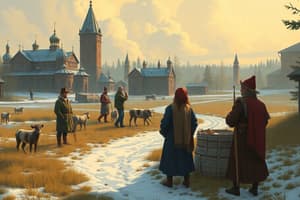Podcast
Questions and Answers
What was a key factor in the development of early civilizations?
What was a key factor in the development of early civilizations?
- Emergence of service-oriented jobs
- Reliable water supply (correct)
- Formation of modern nation-states
- Development of manufacturing
What was a characteristic of the industrial stage?
What was a characteristic of the industrial stage?
- Development of intellectual technology
- Growth of cities and formation of modern nation-states (correct)
- Dominance of knowledge-based industries
- Rise of a highly educated workforce
What is a key feature of post-industrial societies?
What is a key feature of post-industrial societies?
- Prominence of manufacturing jobs
- Dominance of agricultural production
- Focus on defense capabilities
- Importance of human capital investment (correct)
What was a consequence of the transfer of labor force from manufacturing to service in post-industrial societies?
What was a consequence of the transfer of labor force from manufacturing to service in post-industrial societies?
What was a geographic feature that contributed to the development of early civilizations?
What was a geographic feature that contributed to the development of early civilizations?
What was a key aspect of social mobility in post-industrial societies?
What was a key aspect of social mobility in post-industrial societies?
What was a characteristic of civilizations?
What was a characteristic of civilizations?
What was a consequence of the application of intellectual technology in post-industrial societies?
What was a consequence of the application of intellectual technology in post-industrial societies?
What was a key feature of the post-industrial stage?
What was a key feature of the post-industrial stage?
What was a characteristic of early civilizations?
What was a characteristic of early civilizations?
Flashcards are hidden until you start studying
Study Notes
Agricultural Societies
- People began to cultivate plants and domesticate animals, leading to more settled communities
- Agriculture provided a stable food supply, allowing for larger populations and surplus resources
- Social hierarchies and labor specialization emerged, with some individuals focusing on agriculture and others on specialized tasks
The Agrarian Stage
- Characterized by large-scale, intensive agriculture and significant technological advancements (e.g., plow, irrigation systems, new farming techniques)
- Increased productivity, growth of urban centers, and complex social structures
- Hierarchies became more pronounced, with ruling elites and a peasant class
- Persisted for thousands of years and characterized much of human history
The Neolithic Revolution (Agricultural Revolution)
- Marked the transition from nomadic hunting and gathering societies to settled agricultural communities
- Led to the development of permanent settlements, complex social structures, specialized labor, and overall transformation of human society
Industrial Societies
- Emerged with the invention of machinery and widespread use of fossil fuels, leading to the mechanization of production processes
- Brought about rapid urbanization, rise of factory work, and shift from agriculture to manufacturing as the primary economic activity
- Development in agriculture meant not everyone had to be involved in food production, leading to other viable economic opportunities
- Writing systems are crucial for early civilizations, offering benefits such as record-keeping, communication, governance, cultural and intellectual development, education, and historical analysis
Civilizations
- Characterized by agricultural surpluses, allowing for specialized labor, social hierarchy, and establishment of cities
- Two key features of early civilizations: agriculture (permanent settlement and urban life) and development of writing
- Often appeared in major river valleys, providing reliable water supply, irrigation, fertile soil, transportation, trade networks, diverse food resources, valuable materials, defense, and naval capabilities
Political Organizations
- Entities involved in the political process, actively pursuing specific political objectives
- Employ social control to manage members, with methods of control multiplying as societies become more intricate
Post-industrial Societies
- Characterized by the dominance of information, services, and knowledge-based industries
- Technological advancements, particularly in information technology and communication, have revolutionized the way people live and work
- Marked by the rise of a highly educated workforce, prominence of service-oriented jobs, and globalization of economic systems
- Knowledge and innovation are crucial factors in economic productivity and social progress
- Changes in post-industrial societies include:
- Transfer of labor force from manufacturing to service
- Increase in professional employment
- Education as the basis of social mobility
- Importance of human capital investment
- Application of intellectual technology
- Focus on communication infrastructure
- Knowledge as a source of invention and innovation
Studying That Suits You
Use AI to generate personalized quizzes and flashcards to suit your learning preferences.





